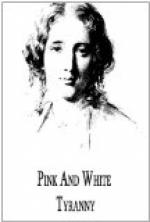“I know it—I know it—oh, it was wrong of me!” and Lillie sobbed, and seemed in danger of falling into convulsions; and John’s heart gave out. He gathered her in his arms. “I can’t help loving you; and I can’t live without you,” he said, “be you what you may!”
Lillie’s little heart beat with triumph under all her sobs: she had got him, and should hold him yet.
“There can be no confidence between husband and wife, Lillie,” said John, gravely, “unless we are perfectly true with each other. Promise me, dear, that you will never deceive me again.”
Lillie promised with ready fervor. “O John!” she said, “I never should have done so wrong if I had only come under your influence earlier. The fact is, I have been under the worst influences all my life. I never had anybody like you to guide me.”
John may of course be excused for feeling that his flattering little penitent was more to him than ever; and as to Lillie, she gave a sigh of relief. That was over, “anyway;” and she had him not only safe, but more completely hers than before.
A generous man is entirely unnerved by a frank confession. If Lillie had said one word in defence, if she had raised the slightest shadow of an argument, John would have roused up all his moral principle to oppose her; but this poor little white water-sprite, dissolving in a rain of penitent tears, quite washed away all his anger and all his heroism.
The next morning, Lillie, all fresh in a ravishing toilet, with field-daisies in her hair, was in a condition to laugh gently at John for his emotion of yesterday. She triumphed softly, not too obviously, in her power. He couldn’t do without her,—do what she might,—that was plain.
“Now, John,” she said, “don’t you think we poor women are judged rather hardly? Men, you know, tell all sorts of lies to carry on their great politics and their ambition, and nobody thinks it so dreadful of them”
“I do—I should,” interposed John.
“Oh, well! you—you are an exception. It is not one man in a hundred that is so good as you are. Now, we women have only one poor little ambition,—to be pretty, to please you men; and, as soon as you know we are getting old, you don’t like us. And can you think it’s so very shocking if we don’t come square up to the dreadful truth about our age? Youth and beauty is all there is to us, you know.”
“O Lillie! don’t say so,” said John, who felt the necessity of being instructive, and of improving the occasion to elevate the moral tone of his little elf. “Goodness lasts, my dear, when beauty fades.”
“Oh, nonsense! Now, John, don’t talk humbug. I’d like to see you following goodness when beauty is gone. I’ve known lots of plain old maids that were perfect saints and angels; and yet men crowded and jostled by them to get the pretty sinners. I dare say now,” she added, with a bewitching look over her shoulder at him, “you’d rather have me than Miss Almira Carraway,—hadn’t you, now?”




